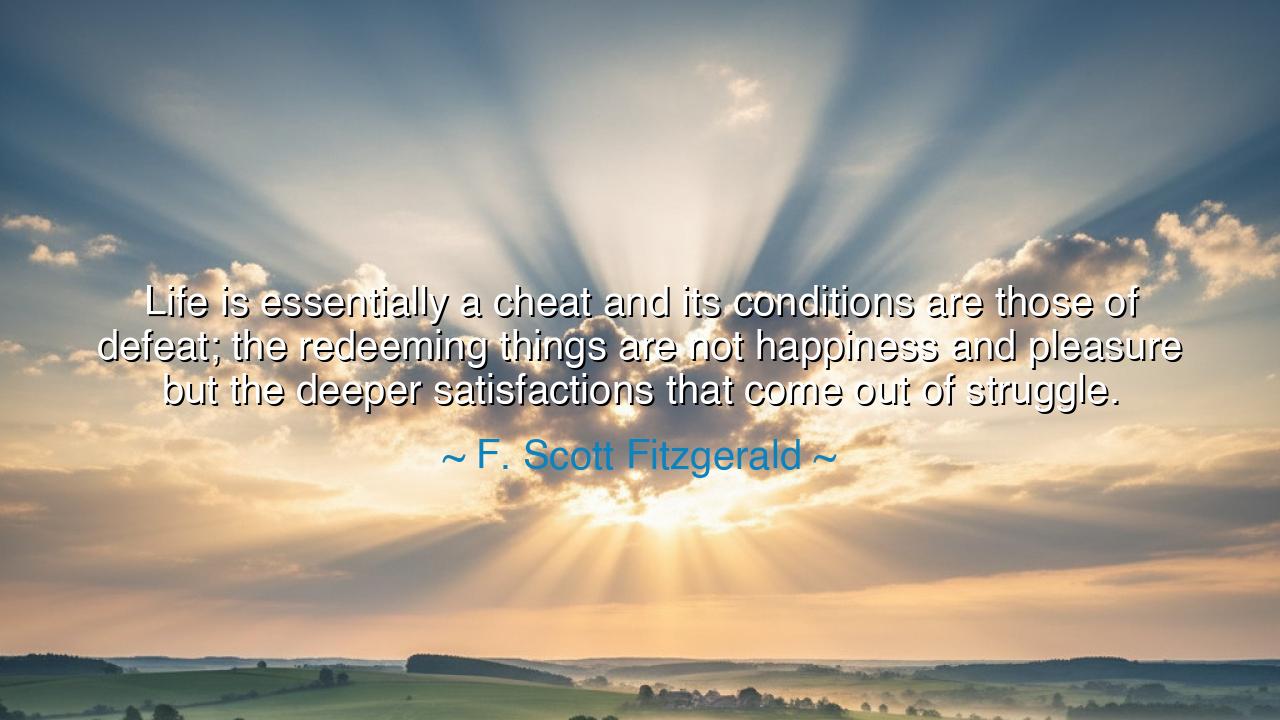
Life is essentially a cheat and its conditions are those of
Life is essentially a cheat and its conditions are those of defeat; the redeeming things are not happiness and pleasure but the deeper satisfactions that come out of struggle.






"Life is essentially a cheat and its conditions are those of defeat; the redeeming things are not happiness and pleasure but the deeper satisfactions that come out of struggle." — F. Scott Fitzgerald
So spoke F. Scott Fitzgerald, the poet of broken dreams and glittering illusions, a man who saw beneath the bright surface of the world the quiet tragedy of being human. His words pierce like a blade through the veil of comfort, for he dares to name the truth few wish to face — that life, in its essence, is not a fair game. It deceives with promises of happiness and success, only to reveal that both are fleeting. It gives us desire, then mocks us with limitation. It teaches us that no one escapes defeat, for time and loss conquer all. And yet, Fitzgerald does not end in despair. From the ashes of disappointment, he draws a sacred revelation: that struggle itself, not pleasure, is the source of our truest satisfaction.
For what is the meaning of defeat if not the crucible through which strength is forged? Life may deceive us, but in its deception, it teaches us endurance. Every dream denied, every heart broken, every battle lost — these are the fires that temper the soul. Happiness is sweet, yes, but it is transient, like the shimmer of sunlight upon a wave. Struggle, however, endures; it deepens, it defines. Through suffering, we learn compassion. Through failure, we learn humility. Through perseverance, we learn the quiet joy that does not glitter, but glows. Fitzgerald, who knew both fame and ruin, speaks as one who has wrestled with the angels of despair and found meaning in their wounds.
He lived in an age of excess — the roaring world of jazz and champagne, of youth and reckless hope. Yet beneath the laughter of the Jazz Age, Fitzgerald saw emptiness. His characters, gilded and graceful, chased pleasure as though it were salvation, only to find it hollow. In his own life, he tasted the bitter wine of success turned to dust. Fame, love, wealth — all betrayed him in time. But out of that betrayal came wisdom: that the soul’s redemption lies not in escaping pain, but in enduring it with purpose. It is in the act of striving, even when the world seems hopeless, that we become truly alive.
Consider the story of Abraham Lincoln, whose life was a tapestry of loss. He knew poverty, defeat, and the death of those he loved most. His youth was marked by failure after failure — in business, in politics, even in love. Yet he did not yield. From the depths of despair, he rose with a quiet strength that would one day save a nation. Lincoln did not seek pleasure or even happiness; he sought meaning. And in that relentless struggle, he found greatness. His life stands as proof that what redeems us is not comfort, but courage — not delight, but duty.
Fitzgerald’s truth is therefore not cynical, but profoundly human. When he calls life a “cheat,” he does not condemn it — he reveals its design. We are meant to wrestle with the world, to face its contradictions, to suffer, and yet to rise. The soul that demands constant pleasure will crumble at the first storm, but the soul that embraces struggle will weather a thousand tempests. The deeper satisfactions he speaks of are not the fleeting joys of success, but the lasting peace that comes from endurance, from knowing one has given one’s best despite the odds.
Even the ancients knew this secret. Heraclitus taught that “strife is justice,” that the world is born and renewed through conflict. Buddha saw that life is suffering — but that enlightenment comes through understanding, not escape. In every age, the wise have known that struggle is not the enemy of the soul, but its teacher. To avoid hardship is to avoid growth; to embrace it is to awaken. Thus, Fitzgerald stands not apart from the sages of old, but among them, giving voice in modern words to a timeless truth.
So, my listener, when the world deceives you — when your plans collapse and your heart breaks — do not curse life for being a “cheat.” Instead, honor the struggle. See in it the forge that shapes you. Seek not constant pleasure, for it fades; seek instead the quiet pride that comes from enduring, from creating, from loving even when love wounds you. Let your defeats become your teachers, and your pain your strength.
For in the end, this is Fitzgerald’s final gift: the reminder that life’s worth is not measured by its ease, but by its depth. The flowers that grow in the valley of sorrow bloom with a beauty unknown to the gardens of comfort. Embrace your struggles, and you will find, as he did, that the world’s cruelest truths hide its most redeeming satisfactions — the triumph of spirit, the nobility of endurance, and the peace of a soul that has faced defeat, yet never surrendered.






AAdministratorAdministrator
Welcome, honored guests. Please leave a comment, we will respond soon